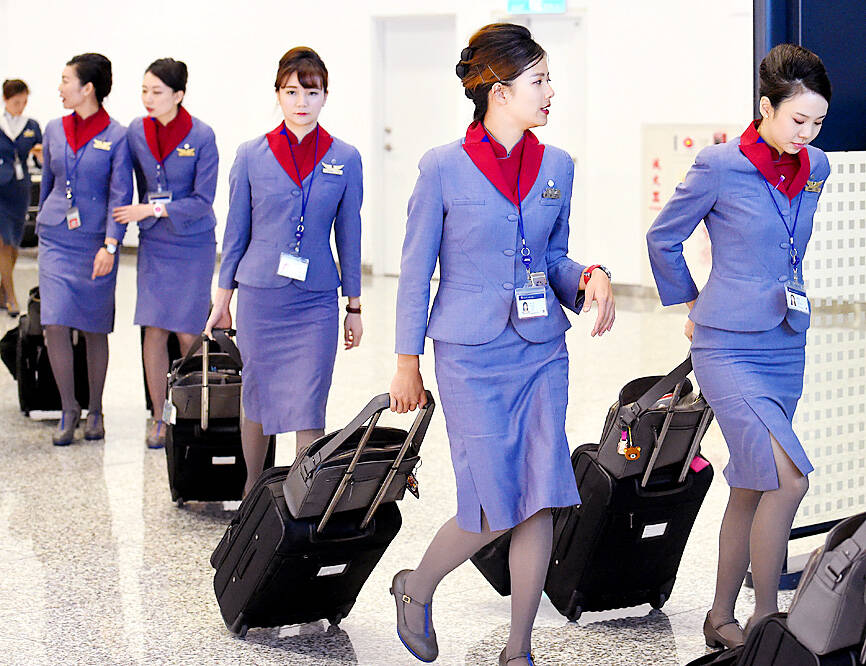The Civil Aviation Administration (CAA) yesterday pledged to hold a meeting with airline executives in three months on allowing gender-neutral uniforms for flight attendants after a legislative committee demanded the change and froze part of the agency’s budget.
The agency faced a barrage of questions about the issue from the legislature’s Transportation Committee, which was reviewing its budget for the next fiscal year.
Earlier this year, 13 EVA Airways Corp (長榮航空) flight attendants filed a labor complaint against the airline for restricting female flight attendants to wearing skirts, along with other gender-specific discriminatory practices. In August, they petitioned the National Human Rights Commission for a change in the dress code.

Photo: Chu Pei-hsiung, Taipei Times
However, the Taoyuan City Government’s gender equality committee in September ruled in favor of the airline.
Many international airlines have changed their policies to add trousers to the uniforms of female flight attendants, but most Taiwanese airlines still require female cabin crew to wear skirts and high-heeled shoes, Democratic Progressive Party (DPP) Legislator Chen Su-yeuh (陳素月) said.
The dress code is incongruous with the UN Convention on the Elimination of All Forms of Discrimination Against Women, she said, adding that the CAA should ensure that Taiwanese airlines adhere to the international treaty.
In 2013, South Korea’s National Human Rights Commission ruled that Asiana Airlines’ policy of requiring all female employees to wear skirts was a practice of gender discrimination, New Power Party Legislator Chiu Hsien-chih (邱顯智) said.
“While it is very common to see female flight attendants at European airlines wear pants, [most] Taiwanese airlines seem very backward as they continue to require women to wear skirts and makeup,” Chiu said. “Taiwan recognizes same-sex marriage and is generally viewed by international community as a country that values gender equality. We should be equally progressive in this respect.”
DPP Legislator Ho Hsin-chun (何欣純) said that wearing a tight skirt could make it difficult for female flight attendants to quickly respond in emergency situations.
The CAA should do more than simply ask airlines to provide a diverse choice of uniforms and demand a timeline on when they would make changes, Ho said.
Lawmakers passed a motion to freeze 10 percent of the budget allocated to “general administrative expenditure” — about NT$50 million (US$1.55 million) — until the CAA submits a written report on how airlines would adjust their corporate policies in accordance with the UN convention.
They also froze NT$500,000 in the Civil Aviation Operation Fund until the agency submits another report in two months on how dress codes would be listed as an item in the gender equality evaluation of airlines.
CAA Director-General Lin Kuo-hsien (林國顯) said that the agency would meet with airline executives in three months to discuss possible options.
“There is no regulation that requires flight attendants to wear skirts or trousers, and airlines design their uniforms based on their corporate policies and whether the uniforms facilitate the work of flight attendants aboard. So far, only female flight attendants of low-cost carrier Tigerair Taiwan wear trousers as uniforms,” Lin said.
“Airlines are not against the idea of allowing employees to vote for diverse uniform designs, but designing a new uniform takes time,” he said.

The CIA has a message for Chinese government officials worried about their place in Chinese President Xi Jinping’s (習近平) government: Come work with us. The agency released two Mandarin-language videos on social media on Thursday inviting disgruntled officials to contact the CIA. The recruitment videos posted on YouTube and X racked up more than 5 million views combined in their first day. The outreach comes as CIA Director John Ratcliffe has vowed to boost the agency’s use of intelligence from human sources and its focus on China, which has recently targeted US officials with its own espionage operations. The videos are “aimed at

STEADFAST FRIEND: The bills encourage increased Taiwan-US engagement and address China’s distortion of UN Resolution 2758 to isolate Taiwan internationally The Presidential Office yesterday thanked the US House of Representatives for unanimously passing two Taiwan-related bills highlighting its solid support for Taiwan’s democracy and global participation, and for deepening bilateral relations. One of the bills, the Taiwan Assurance Implementation Act, requires the US Department of State to periodically review its guidelines for engagement with Taiwan, and report to the US Congress on the guidelines and plans to lift self-imposed limitations on US-Taiwan engagement. The other bill is the Taiwan International Solidarity Act, which clarifies that UN Resolution 2758 does not address the issue of the representation of Taiwan or its people in

US Indo-Pacific Commander Admiral Samuel Paparo on Friday expressed concern over the rate at which China is diversifying its military exercises, the Financial Times (FT) reported on Saturday. “The rates of change on the depth and breadth of their exercises is the one non-linear effect that I’ve seen in the last year that wakes me up at night or keeps me up at night,” Paparo was quoted by FT as saying while attending the annual Sedona Forum at the McCain Institute in Arizona. Paparo also expressed concern over the speed with which China was expanding its military. While the US

SHIFT: Taiwan’s better-than-expected first-quarter GDP and signs of weakness in the US have driven global capital back to emerging markets, the central bank head said The central bank yesterday blamed market speculation for the steep rise in the local currency, and urged exporters and financial institutions to stay calm and stop panic sell-offs to avoid hurting their own profitability. The nation’s top monetary policymaker said that it would step in, if necessary, to maintain order and stability in the foreign exchange market. The remarks came as the NT dollar yesterday closed up NT$0.919 to NT$30.145 against the US dollar in Taipei trading, after rising as high as NT$29.59 in intraday trading. The local currency has surged 5.85 percent against the greenback over the past two sessions, central